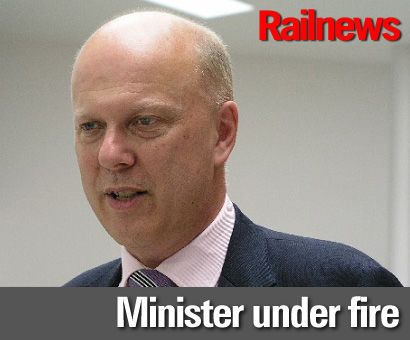TRANSPORT secretary Chris Grayling has written to MPs, explaining that contingency plans are being prepared ahead of fresh RMT strikes over DOO next month. He has condemned the RMT’s stance over the issue of safety-critical staff on trains.
The RMT has described his letter as ‘unprecedented political interference’ in the long-running dispute about driver-only operation.
The union has called 24-hour strikes on Northern and Merseyrail on 8 November, accompanied by 48-hour walkouts on Greater Anglia, Southern and South Western Railway on 8 and 9 November.
Previous experience suggests that Greater Anglia and Southern will be least affected, but the implications of a conductors’ strike on SWR, which would be the first since the franchise started in August, are not yet clear.
In his letter Mr Grayling says: “The RMT’s action is aimed at deliberately disrupting passengers. I want to assure you that the RMT’s dispute is not about jobs: affected staff have been offered cast iron guarantees by the train companies involved. This dispute is not about money: affected staff have also been offered pay guarantees. And this dispute is not about safety: driver controlled trains have been ruled as safe by the regulator.”
He continues: “I will be taking every step to ensure that as many people as possible can use the railway to get to work, school and important appointments on the RMT’s strike days. Contingency planning is well underway and I will write to you with a fuller outline of plans closer to 8 November.”
His intervention has been met with resistance from the RMT, which described his behaviour as 'damaging and dangerous’, and claimed that the government are ‘driving the current rail disputes for their own politically-motivated reasons’.
The union’s general secretary Mick Cash said: “This letter from Chris Grayling nails down once and for all the core fact that it’s the Government who are imposing Driver Only Operation on the train operators and who are directing the attack on Britain’s train guards from the centre. Instead of allowing normal industrial relations to run their course the train companies are boxed in by central diktat from Chris Grayling and the DfT.
“This unprecedented political interference explains why RMT has been able to reach negotiated settlements over the guards and the method of train dispatch in Scotland and Wales, where responsibility is devolved, but have had the door slammed in our face in England when it comes to any meaningful talks.
“Chris Grayling’s letter shows that the Government are driving the current disputes for their own politically-motivated reasons. That damaging and dangerous behaviour needs to stop right now.”
Train operators and the Rail Delivery Group have already called for new talks in the long-running dispute, which started with strikes on Southern last year, sparking demonstrations by angry commuters, while the executive of ASLEF has reached an agreement with Govia Thameslink Railway over driver controlled operation. The result of a members’ ballot is expected on 8 November.
Analysis
Sim Harris
ONE of the core aims of privatising the railway in the 1990s was to transfer operational and financial responsibility to the private sector, but Mr Grayling is now taking the helm in a way which does indeed appear to be unprecedented.
It is hard to see how his gesture will do anything to ease the tensions in this increasingly protracted dispute over whether a second safety-critical member of staff is needed on all trains. The DfT points to services such as Thameslink and its predecessor Midland Electrics, which started in 1982 as DOO, as examples of how single-staffing works. The RMT maintains that the absence of a second safety-critical member of staff poses an unacceptable risk to safety. Alongside its anti-DOO campaign, the union is also opposing Transport for London over the occasional absence of staff on some suburban Underground stations.
What the industry and rail passengers both want is an end to the row, and a return to normal services.
Mr Grayling has provided a short-term message of comfort with his promise of contingency plans, but at a deeper level he may have only turned up the gas a little more under this cauldron of simmering dissent.


